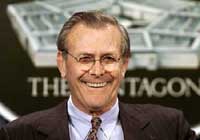Bremer requested more troops; Rummy said no

A few days ago we learned from Paul Bremer, the man initially in charge of the U.S. - excuse me - coalition occupation of Iraq, that the Bush administration and U.S. - excuse me, again - coalition military commanders failed to foresee the brutal insurgency that would go on to kill or maim tens of thousands of people.
Today in Washington, Defense Secretary Donald Rumsfeld acknowledged that he had received a request from Bremer in May of 2004 requesting up to 30,000 additional troops to enhance security and quell the insurgency in Iraq. Bremer's request was denied.
The request, disclosed in Bremer's new book on his year-long tenure in Iraq, reflected what he said was his fear that the United States was becoming "the worst of all things -- an ineffective occupier."
Rumsfeld, speaking (today) at a Pentagon news briefing, recalled that he showed the Bremer memo to the chairman of the Joint Chiefs of Staff then, Gen. Richard B. Myers, saying: "This is a reasonable proposal from a reasonable person; let's look at it."
But after evaluating the proposal, the Joint Chiefs of Staff concurred with U.S. commanders responsible for Iraq that troop levels were adequate, said Gen. Peter Pace, who succeeded Myers as chairman of the Joint Chiefs and appeared with Rumsfeld at yesterday's briefing.
So on one hand we have leadership that failed miserably to anticipate the insurgency, which would have required additional troop strength to control. And on the other hand, once the insurgency had made itself plainly evident, we have leadership that failed to respond to new requirements. Sounds to me like a lot of failures by our leadership.But the interesting kicker is that Rumsfeld never responded to Bremer's request.
In his book, Bremer says that Rumsfeld never responded to his recommendation to add more troops. Rumsfeld said he did reply, although not substantively.
"I thanked him for his suggestion and said we would look into it, and we did," Rumsfeld said. He said Bremer departed his post before the Joint Chiefs completed its response, and so Bremer did not receive that. "By the time he left he was . . . no longer in a position where it would be appropriate to have given him the outcome, and he never asked that I recall," Rumsfeld said. "So it's no big deal."
Of course, this was at a very critical point politically in the U.S. with the Presidential election just months away. One suspects there was trepidation within the administration about the potential political fallout from a significant increase in the number of troops in Iraq leading up to the election. While it may have been the right thing to do militarily (although Rumsfeld disputes that), it certainly would have been a political liability.I wonder what other interesting tidbits we may be hearing from Paul Bremer.



0 Comments:
Post a Comment
<< Home